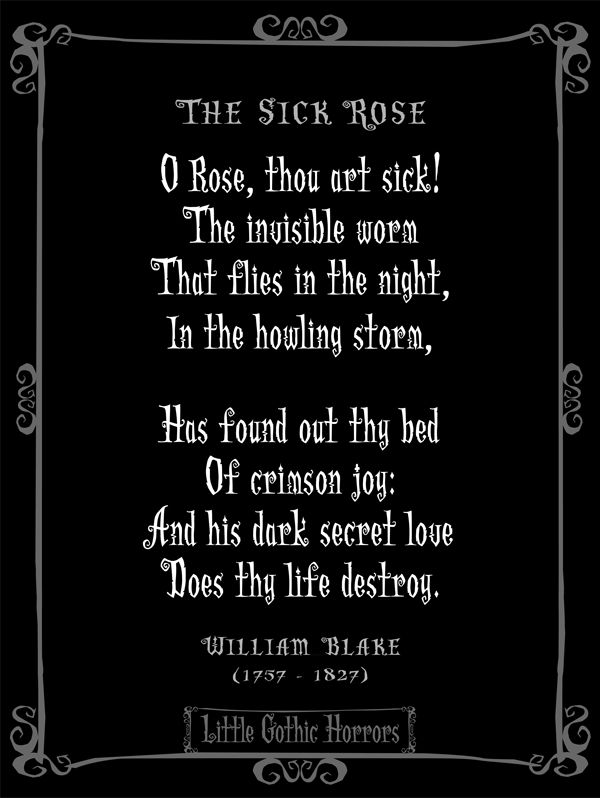
In 1996, three industry leaders (Intel, Ericsson, and Nokia) met to plan the standardisation of this short-range radio technology to support connectivity and collaboration between different industries. It was so prominent that his nickname was Blåtand, which literally translates from Danish to “Bluetooth”. Gormsson was also known for his dead tooth, which had a very dark blue-grey shade. There are many accomplishments credited to him, but greatest of all is that he united Denmark and Norway under his rule. Harald “Blåtand” Gormsson was a viking king who ruled Denmark and Norway from the year 958 until 985.
#Gothic literature words Bluetooth#
He is now believed to have been describing gorillas, but in the 18th century, the terms orangutan and pongo were used for all great apes.ġ990s: said to be named after King Harald (910–85), credited with uniting Denmark and Norway, as Bluetooth technology unifies the telecommunications and computing industries. The name of the genus comes from a 16th-century account by Andrew Battel, an English sailor held prisoner by the Portuguese in Angola, which describes two anthropoid “monsters” named Pongo and Engeco. However, the word underwent a semantic extension to include apes of the Pongo genus at an early stage in the history of Malay. It is possible that the word was originally used by the locals of Java to describe savage tribes of the Sunda Islands, made up of actual forest-dwelling human beings, and that Europeans misunderstood it to mean the ape. For them, a disaster was a particular kind of calamity, the causes of which could be attributed to an unfavourable and uncontrollable alignment of planets.įrom Dutch orang outang, from Malay: literally, ‘ forest man’ (Malay orang ‘man, person’ + (h)utan ‘forest’. The ancient Greeks were fascinated by astronomy and the cosmos, and truly believed in the influence of celestial bodies on terrestrial life. The pejorative prefix dis- and aster (star) can be interpreted an ill-starred event. The English word is most closely tied to the French désastre, which is derived from the Old Italian disastro, itself derived from Greek. The term was latinised by Cicero as veriloquium.įrom Italian disastro ‘ ill-starred event’, from dis- (expressing negation) + astro ‘star’ (from Latin astrum ). The neuter of etymos ‘true, real, actual’ is related to eteos ‘true,’ which perhaps is cognate with Sanskrit satyah, Gothic sunjis, and Old English soð.


In other words, the ‘study of the true sense (of a word)’, with – logia ‘study of, a speaking of’ + etymon ‘true sense, original meaning’. Later, the word came to mean any substance producing immunising antigens.įrom Latin and Greek etymologia, meaning ‘ analysis of a word to find its true origin’. The boy was immune, and did not contract the disease. After the boy contracted and recovered from cowpox, Jenner went on to inoculate him with smallpox. To that effect, Jenner inoculated an eight-year-old boy with material taken from a milkmaid’s cowpox sores. In the 18 th century, an English physician named Edward Jenner set about to determine whether there was any truth to an urban legend of his day: milkmaids who got cowpox didn’t get smallpox. The definition was later extended to mean ‘ wash the hair’ in 1860. The French translation of the term, eau-de-vie, refers to a clear brandy distilled from the fermented juice of pears, raspberries, or other fruit.įrom the Hindi word champo, imperative of champna, meaning ‘to press’.ĭerived from the Sanskrit root chapati (चपति), the word initially referred to any type of pressing or kneading.

from Irish and Scottish Gaelic uisge beatha ‘ water of life’.Ī similar Latin term, aqua vitae, inspired coinages in other languages as well, such as aquavit (also styled as akvavit – Swedish, Danish, and Norwegian), referring to a clear liquor flavoured with caraway seeds. It is believed that the term refers to killers who would consume the substance before carrying out their attacks, which induced the vision of Paradise.Ībbreviation of obsolete whiskybae, variant of usquebaugh. Via French, or medieval Latin assassinus, from Arabic ḥ ašīšī ‘hashish-eater’. There are many theories that attempt to explain this etymology, one being that during theatrical performances dedicated to Dionysus, a goat would be sacrificed, with an ode being sung by a choir. Via Latin from Greek tragōidia, from tragos ‘goat’ + ōidē ‘song, ode’. We’ll tell you about the origin and evolution of “tragedy”, ” assassin”, “whisky”, “shampoo”, “vaccine”, “etymology”, “disaster”, “orangutan”, “Bluetooth” and “goth”. Do you like learning about the origin of words? Are you fascinated by the stories behind how words came to be? Then this article is for you! Take a journey through several languages and learn more about history itself.


 0 kommentar(er)
0 kommentar(er)
